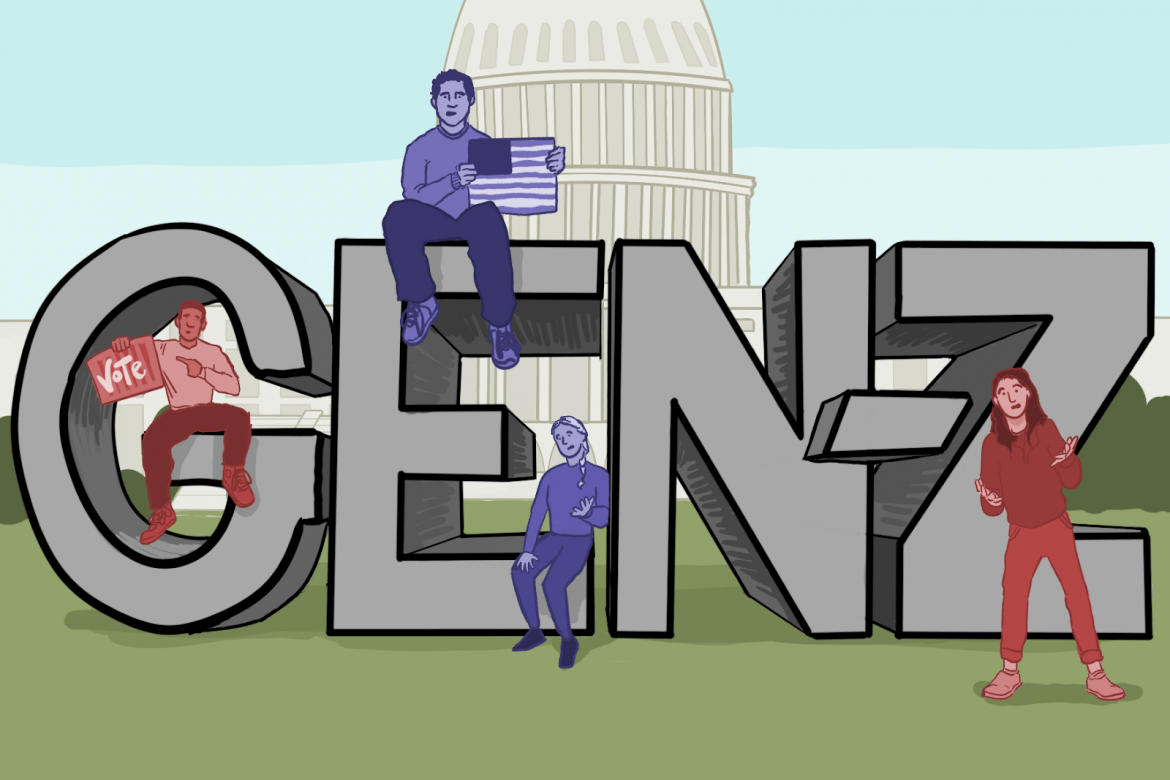For years, Generation Z has watched the world confront significant events of modern history, including the election of the first Black president, the rise of global warming and the COVID-19 pandemic. As part of Generation Z, the Clarke Central High School Young Democrats club remained politically active during the 2020 presidential election, despite the fact that no one was old enough to vote. “I would love to be able to vote, but I wouldn’t say it frustrates me that I can’t,” CCHS Young Democrats club president Penny Merva, a junior, said. “I (was) a poll worker on election day, which (was) available to anyone who is 16 years of age or older. I enjoy opportunities like this because although I cannot physically vote, I know that I can still have some influence in the election.” Graphic by Lilli Sams
As Athens-area high school students become increasingly involved in U.S. politics, many are participating in protests and voting for the first time as they develop varying political opinions.
Most of Generation Z, born from the early 1990’s to the early 2010’s, witnessed the 2020 presidential election without being able to vote. While college-aged students in this generation are eligible to cast ballots, many high school students are forced to look elsewhere for political involvement.
As the next generation of voters, it is clear that Gen Z is paying extremely close attention to U.S. politics, despite the fact that many vote. Instead of internalizing their opinions and waiting until the appropriate voting age, many people have raised their voices, sharing their opinions on hot political topics through social media, protests and clubs.
“As president of the (Young Democrats club), I believe it’s important for (me) to be knowledgeable of political happenings of both Democrats and Republicans as to better serve the club,” Clarke Central High School Young Democrats Club President Penny Merva, a junior, said. “To stay informed, I keep up with daily news from sites like (The New York Times), CNN, or Politico, and I also watch all of the presidential and vice presidential debates.”
Many teens are heavily influenced by their parents’ political opinions, they gain their own perspective as they get older. Merva is no exception.
“I definitely believe that my background and parents play a role in my political beliefs. Much of this isn’t through the label of being liberal or conservative, but through seeing how my parents interact socially and economically with the world and how these actions coincide with liberalism, and how it has influenced me to see the world similarly,” Merva said.
Despite not being old enough to vote, Merva takes advantage of other ways she and the Young Democrats can get involved in politics.
“There are plenty of ways that teens can participate in elections. For example, (before the election) a few other members of the club and I did sign waving for (Democrat for Georgia House District 117) Mokah Johnson to encourage people to vote for her as a Georgia state representative,” Merva said. “I enjoy opportunities like this because although I cannot physically vote, I can know that I can still have some influence in the election.”
Unlike Merva, CCHS senior Anaiah Aziabor stays politically informed because she is old enough to vote. Before the presidential election, Aziabor was concerned about how each presidential candidate could better the nation and how she would benefit when they took office.
“(My parents) ask (which presidential candidate) can provide what is best for me as a person and who is going to make the country a better place,” Aziabor says. “(Before voting), I am constantly watching the news, listening to interviews and watching press conferences. (The 2020 presidential election) is my first election that I am able to vote in, so I have to know who I am voting for and what I am voting for.”
Athens Academy junior Emily Coggins keeps up with politics to stay knowledgeable about the issues that are important to her.
“There are many issues that are important to me. I am a strong supporter of the police. I disagree with the movement to defund the police because I am grateful for the men and women who keep us safe. While they are not perfect, I believe that they are necessary for keeping the country safe,” Coggins said.
Understanding the tensions that politics can create, Coggins strives to find a balance between staying informed and respectively sharing her opinion.
“I watch Fox News and Newsmax a couple of times a week and read some news articles online if a big story breaks. I believe it’s important for me to stay informed about politics, but they can get in the way of friendships,” Coggins said. “While I do not want to hurt anyone’s feelings or argue with friends, I believe that I should voice my opinions occasionally because they are important to me.”
CCHS sophomore Khalisah Ealey is uninterested in voting, but thinks the minimum voting age should be lowered.
“I like to stay informed, and just because I’m not particularly political doesn’t mean I should stay ignorant to the situation,” Ealey said. “I feel like the voting age should be lowered because I know a lot of people in high school that are very politically informed.”
Young adults ages 16 to 29 accounted for one third of the rise in unemployment between February and April 2020 when the COVID-19 pandemic first began. As a 17-year-old paid employee, CCHS junior Henry Crowder believes that since he is responsible for paying taxes, he should have the right to vote as well.
“I think there are some standards that teenagers are held to where they are held as an adult, and they should have to be held as an adult all the way or not at all,” Crowder said. “If I can be taxed as an adult and I can be tried as an adult (who is) 18, I feel like I should be able to vote (like) an adult as well.”
